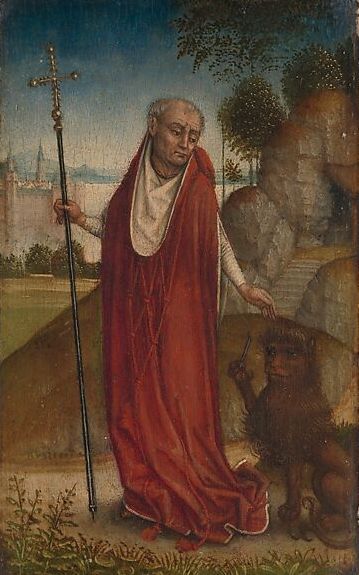Feast Day: September 30
I’ve tried to convince my wife that buying a house with a yard is a perfect opportunity to honor creation by adding a little something like an alligator moat or an elephant paddock. She gives me one of those looks and makes some comment about exotic pet laws, dangers to babies, and the inadvisability of mixing subtropical animals with two feet of snow.
In my defense, lots of saints had unusual animal companions. Francis made friends with a wolf and birds; Cuthbert had a pair of otters who would dry him with their fur after he stood praying for hours in the frigid North Sea; several Russian hermits tamed ferocious bears; and Jerome, as one can see in many paintings of him, had a lion. I’m not sure if the point of the story of Jerome and the lion is that exotic pets are good, but there is a moral in it about compassion and judgment worth hearing.

God’s Grouch
Jerome belonged to the Patristic flowering of brilliant Christian writers in the late Roman Empire. He was a priest, then a monk near Bethlehem and, above all, a scholar who loved language. He earned his greatest fame as the primary translator of the Bible from Greek and Hebrew into Latin. Although Jerome did not do the whole translation on his own, he did much of it. He helped establish the principle that Old Testament translators should go back to the original Hebrew text (instead of using the common Greek version of the Old Testament) and use Jewish rabbinical scholarship. The resulting “Vulgate” translation using the everyday Latin of the Roman people became the standard version of the Bible for the Western church for over a thousand years.
Jerome was an accomplished writer in his own right who used the power of classical rhetoric and his deep knowledge of scripture to compose scathing rebuttals of theologians he deemed heretical. One of my Notre Dame professors nicknamed him “God’s Grouch” for his caustic wit and ornery nature. I sometimes find Jerome hard to like. He always had rational arguments behind his attacks on others, but his sharp critiques and prickly readiness to take offense could overshadow his ideas. There’s an interesting exchange of letters between an old Jerome and a young St. Augustine in which Jerome, incensed by some misunderstood gossip and a disagreement over interpreting Paul’s letters, erupted at the admiring younger man. Augustine managed to mollify Jerome, only to be sharply rebuked by the older hermit for taking too lighthearted of a tone when Augustine wrote about how much he looked forward to “playing in the field of scripture” together. Unlike more joyful saints, Jerome had no time for play.

The Lion and Compassion
Jerome is the last person you’d expect to make time for a pet, although, if he did, it makes sense that the irascible old hermit discovered a kindred spirit in a ferocious desert lion. The story goes that a huge, roaring lion suddenly appeared near Jerome’s monastery in Bethlehem (lions did indeed live in the desert hills of the Middle East until early modern times). The lion stalked the open wasteland, approaching the local village and monastery, baring its teeth and howling in an unearthly manner without any of the circumspection typical of a wild animal. As it stalked towards Jerome’s community, the other monks fled in terror. Jerome, however, calmly waited and watched the lion, noticing the beast’s odd, limping gait. When the lion reached the saint, Jerome knelt and lifted the lion’s front paw. He saw a large thorn painfully embedded there and carefully pulled it out. The relieved lion stopped his howls. It lay meekly down in the monk’s cell to rest, lapping up the water that Jerome shared with it. The lion continued to live near the monastery for years, wandering in and out of the community without causing anyone harm.
The story of Jerome’s lion is unlikely to be historically true. It only appears centuries after Jerome’s death. What I like about it, though, is precisely how out of character it seems for Jerome. Is this saint, the one always eager to take offense, really the person likely to take the time to recognize why a creature is behaving badly and to use that empathy to make friends with it? My initial answer is “no,” but then I hesitate. Jerome had friends. Paula, a widow who Jerome taught in Rome, traveled all the way to the Holy Land with her daughter to embrace the religious life in a women’s community near her mentor and maintained a friendship with Jerome until her death. Some people at least saw beyond Jerome’s ferocious exterior and found something admirable and lovable. Maybe it is appropriate that one of the most common stories about Jerome shows him doing the same with a creature that most people feared.
Reflections on God’s Grouch and the Lion
Some people are just not as pleasant to be around as others. They may be grumpy, socially awkward, or have too strong of opinions. They can be easy to judge. Empathy for them can be hard, especially when they reject it. As Christians, we are called to love them still. If “God’s grouch” can be a saint, then we can expect a wide variety of personalities to find a home in God’s heavenly kingdom. It is unfortunate in particular that devout Christians with a mutual desire to find the truth and follow Jesus can so often find themselves in conflict with each other. Let’s try to have a little charity towards others, even when we disagree. Maybe, if we listen, we’ll learn something, or maybe we’ll discover a hurting in them that we can comfort in Jesus’ name. Regardless, we’re hopefully going to spend an eternity with these people, so we may as well start getting to know them now.
If you have a response, thoughts, or questions, please comment at the bottom of the page. Consider subscribing below to get weekly email notifications about new reflections and other news.



Couldn’t agree more, Dr Eric! I find it disturbing that so many people who fully expect to have their own views respected are so ready to attack people with different views and opinions.
I have been wondering whether the story about Saint Jerome was accidentally attributed to him as he has a similar name to another saint – Geronimos of Jericho – who apparently did exactly the same thing.